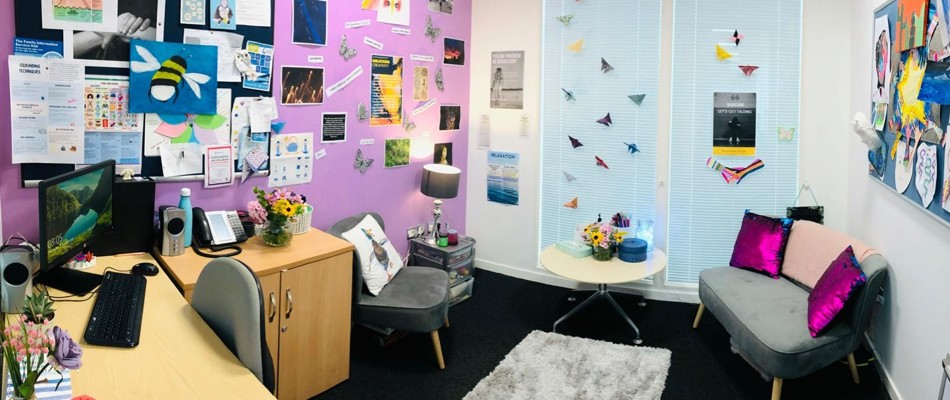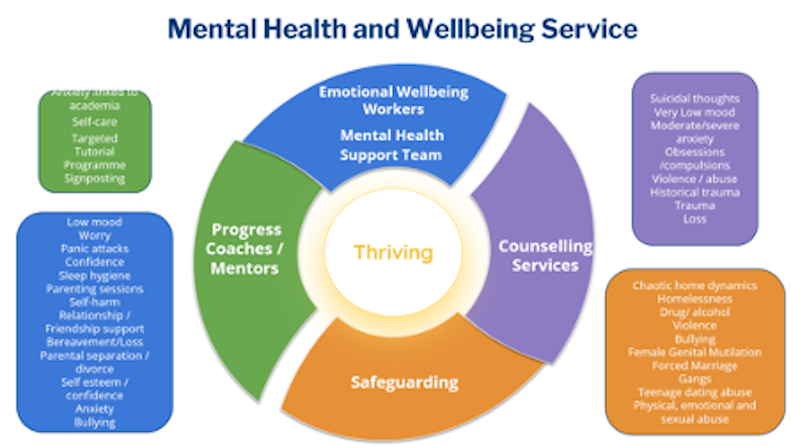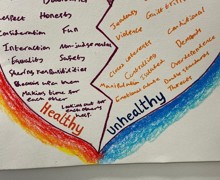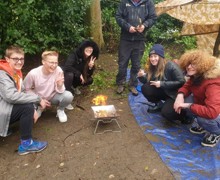They belong to all of us - a holistic approach to mental health
Back
Even prior to the pandemic, we were all facing challenges in supporting our young people with their mental health and wellbeing, and the varied experiences of our young people over the past eighteen months have only made this area of support even more challenging.
With funding from the Stoke Opportunity Area, the safeguarding, counselling and wellbeing team at our college responded to being presented with increasingly significant and at times unmanageable levels of Social, Emotional and Mental Health related difficulties by developing a project to support early intervention, but also general mental health and wellbeing. The team had identified that there was a ‘gap’ in support services which could address low level, early-intervention mental health support for our students, such that problems didn’t escalate to the level the team was frequently seeing.
Following discussions with CAMHS (Child and Adolescent Mental Health Services), we adopted the Thrive Model as part of the programme, as the team recognised that this model suited the needs of our students. It was identified, for example, that students were self-referring to a number of teams with similar functions across the college simultaneously and this was replicating workload for staff and resulting in a lack of a clear plan for supporting students. In the Thrive Model, by contrast, we allocated the different aspects of support to specific teams dependent on expertise and role. The model places the student at the centre of their support and it offers the student the opportunity to change in and out of the different phases / services depending upon their specific need at any one particular time. You can see how we support students with different types of issues using different modalities in the service plan below.

As a result of this project the College has seen a change in the way that all staff respond to intervention with students. We run Emotional Wellbeing drop-in services for students; students can access these outside of lessons, but where appropriate staff can also take students there during a lesson, positively impacting teaching and learning by enabling the teacher to focus on teaching during lesson time. Furthermore, the College has seen teaching and support staff accessing specially designed training so that they can better understand and support the students within their classes, and more staff accessing mental health and wellbeing afternoons supporting their own wellbeing. These are some of the examples that are more difficult to measure but to us are equally important. Being able to offer an early intervention service for our students has made such a huge difference to how support is offered: timely, focused and solution driven.
The results
- Counselling numbers have significantly decreased
- Emotional wellbeing has been integrated with the sixth form setting
- Holistic support is now standard practice
- The Drop-In service has reduced the demand on teachers to address ‘low level’ emotional wellbeing situations
- Mental Health Connectors are now in place offering peer support
- Positive promotion to wider community and linked education providers
- Staff training and well-being days
- Holistic support for students
- Appropriate levels of support at the right time according to need
- Students who have required the service have shown a positive decrease in their level of psychological distress
- Reduction in the number of missed appointments
- Equipping students with ongoing support mechanisms
Further development
This project and model has created an ethos change across all staff within the College setting. Feedback has been positive in relation to the staff training and as a result an ‘in-house’ training programme has been implemented. This is beneficial as there is not a reliance on external providers, along with it being tailor-made to the needs of our staff and students within the College and across the Potteries Educational Trust. A mental health and wellbeing induction has been provided for all new staff, highlighting the College’s approach and ethos towards mental health and wellbeing and the expected role and responsibility of all staff within the model. Staff will continue to be upskilled and have their autonomy and ownership encouraged. A Mental Health Committee with representatives from all support and curriculum areas has been implemented with one of its primary aims to embed and support the message that ‘they belong to all of us”.
Some top tips to ensure successful implementation of similar projects
- Make the student the centre of everything you do
- Do not make the mistake of thinking you need a brand new service. The Thrive model can be adapted to the needs of the college and students.
- Don’t overcomplicate things
- You need the support of your Principalship Team
- Implement a student led referral process
- Enthusiastic and motivated staff
- Regularly evaluate and don’t be afraid to adapt accordingly.
Claire Gaygan is an Assistant Principal and DSL at City of Stoke-on-Trent Sixth Form College. Earlier this year, the college's mental health and wellbeing team won the SFCA Health and Wellbeing Award for its approach. This is the first in a series of blogs from the award winners explaining how they achieved their success.





